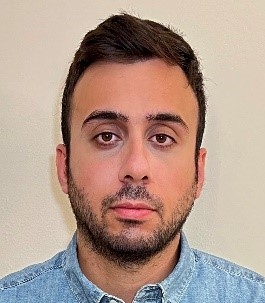Short Hybrid Seminars on Selected Topics in Signal Processing
The Montreal Chapter of the IEEE Signal Processing Society, in collaboration with STARaCom, cordially invites you to attend the following talks, as part of its series of Short Hybrid-Seminars on Selected Topics in Signal Processing. Now that restrictions imposed by Covid-19 have been relaxed, this event will take a hybrid form, with participants having the option to attend in person or virtually.
Date and Time
Location
Hosts
Registration
-
 Add Event to Calendar
Add Event to Calendar
Loading virtual attendance info...
- 3480 University St.
- ECE Department, Room 603
- Montreal, Quebec
- Canada H3A 0E9
- Building: McConnell Engineering
- Click here for Map
- Contact Event Host
-
Prof. Benoit Champagne, ECE Department, McGill Univerity, Montreal
- Co-sponsored by STARaCom
Speakers
 Hamed Hojatian of Polytechnique Montreal
Hamed Hojatian of Polytechnique Montreal
Unsupervised Deep Learning for Massive MIMO Hybrid Beamforming
Hybrid beamforming is a promising technique to reduce the complexity and cost of massive multiple-input multiple-output (MIMO) systems while providing a high data rate. In particular, subarray hybrid beamforming can further decrease power consumption by reducing the number of phase shifters. Hybrid precoding, however, is a challenging task that requires feedback from channel state information (CSI) and solving a complex optimization problem. Furthermore, in subarray hybrid beamforming, designing the hybrid beamforming vectors is more complicated due to the discrete nature of the subarray connections and the phase-shift amounts, where finding the optimal connections between RF chains and antennas requires solving a non-convex problem in a large search space. Therefore, we first propose a novel RSSI-based unsupervised deep learning method to design the codebook-based fully connected hybrid beamforming in frequency-division duplex (FDD) massive MIMO systems. Then we extend it to codebook-free subarray hybrid beamforming (Fixed and Dynamic Subarray) in time-division duplex (TDD) communication with noisy CSI. We evaluate our proposed solutions on a realistic ray-tracing channel model, where we show that the proposed methods not only greatly increase the spectral efficiency, especially in FDD communication by using partial CSI feedback, but also have near-optimal sum-rate and outperform other state-of-the-art full-CSI solutions.
Biography:
Hamed Hojatian received the B.Sc. degree in Electrical Engineering from Babol Noshirvani University of Technology (BNUT), Babol, Iran, in 2014, the M.Sc. degree in wireless communication systems engineering from Isfahan University of Technology (IUT), Isfahan, Iran, in 2017. He is currently working toward the Ph.D. degree in the Department of Electrical Engineering, Polytechnique Montreal, Montreal, QC, Canada. His current research interests include applied machine learning in wireless communication, intelligent beamforming, MIMO communication system, signal processing and optimization. He is an active reviewer of several IEEE journals. He also has practical experience in 3G and LTE RAN planning and optimization.
Email:
Address:Polytechnique Montreal, Electrical and Computer Engineering, Montreal, Quebec, Canada
 Minh Dat Nguyen of INRS-EMT
Minh Dat Nguyen of INRS-EMT
Integrated Computation Offloading, UAV Trajectory Control, and Resource Allocation in SAGIN
We study the computation offloading problem in space-air-ground integrated networks (SAGIN), where joint optimization of partial computation offloading, unmanned aerial vehicle (UAV) trajectory control, user scheduling, computation, resource allocation, and admission control is performed. Specifically, the considered SAGIN employs multiple UAV-mounted edge servers with controllable UAV trajectories and a cloud sever which can be reached by ground users (GUs) via multi-hop low-earth-orbit (LEO) satellite communications. This design aims to minimize the weighted energy consumption of the GUs and UAVs while satisfying the maximum delay constraints of underlying computation tasks. To tackle the underlying non-convex mixed integer non-linear optimization problem, we use the alternating optimization approach where we iteratively solve four sub-problems, namely user scheduling, partial offloading control and bit allocation over time slots, computation resource and bandwidth allocation, and multi-UAV trajectory control until convergence. Moreover, feasibility verification and admission control strategies are proposed to handle overloaded network scenarios. Furthermore, the successive convex approximation (SCA) method is employed to convexify and solve the non-convex computation resource and bandwidth allocation and UAV trajectory control sub-problems. Via extensive numerical studies, we illustrate the effectiveness of our proposed design with respect to several baselines.
Biography:
Minh Dat Nguyen received the B.Eng. degree in Electronics and Communications Engineering from Posts and Telecommunications Institute of Technology (PTIT), Hanoi, Vietnam in 2016, and the M.Eng. degree in Communications Network from Japan Advanced Institute of Science and Technology (JAIST), Japan in 2018. He is currently pursuing the Ph.D. degree with the Institut National de la Recherche Scientifique–Énergie, Matériaux et Télécommunications (INRS-EMT), Université du Québec, Montréal, Québec, Canada. His current research interests include UAV communications, radio resource management, 5G new radio, and AI for wireless communications.
Email:
Address:INRS-Énergie , Matériaux et Télécommunications, Montreal, Quebec, Canada

